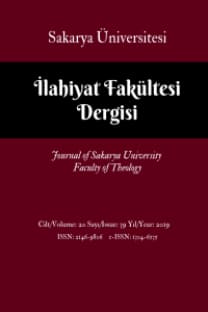İCMÂ TEORİSİ VE BÂKILLÂNÎ’NİN ETKİSİ
Bu makalede, ilk dönem usûlcülerinden Bâkıllânî’nin icmâ anlayışı, kendisinden önceki iki usûlcü Şafiî ve Cessâs ile sonraki iki usûlcü Cüveynî ve Gazzâlî’nin görüşleri de dikkate alınarak incelenmiştir. Böylece Bâkıllânî’nin görüşleri ile birlikte ilk dönemlerde icmâın gelişimi bir nebze ortaya konulmaya çalışılmıştır. Hanefî usûlcü Cessâs’tan sonra kelamcıusûlcü olarak ilk defa icmâı geniş bir şekilde ele alan Bâkıllânî, aynızamanda icmâıilk tanımlayan usûlcüllerden biri olmuştur. Daha sonra icmâın gerçekleşmesinin imkânını tartışmış ve bunun mümkün olduğunu, ilk dönemlerde bunun sabit olduğunu ve icmâın imkânını ve sübutunu reddedenlerin iddialarının geçersizliğini ifade etmiştir. İcmâın hücciyyetinin delillerinin akli değil, naklî olacağını söylemiş ve bu bağlamda Kur’an’dan bazı ayetleri ve bazı hadislerin ortak manasını delil olarak aktarmıştır. Ayrıca icmâın gerçekleşmesinin şartlarını, geçerli olduğu alanları ve diğer bir takım fer’î meseleleri incelemiştir.
The Theory of Idjma and Effect of Baqillani
In this article, the idjma theory of Baqillani, one of the methodists from the early period, is examined by taking into account considering his views in relation to the views of his two predecessors: Methodists Shafiᶜi and Cassas and his two successors: Methodist Cuwayni and Ghazzali. By doing that, the development of idjma in its formative period has been presented. After Cassas who is a Hanefi methodist Baqillani is the first mutakallim methodist dealing with idjma in great length and defining it. He also discusses the possibility of the ralisation of idjma and argued it was possible. He said it was constant at the begining and expressed that the arguments of those who deny the posibilities and establishment were not valid. He said that the evidences forthe validity of Idjma are not rational but sciriptural. In this context, he prove his case by gathering some verses from Quran which share the same meaning with hadiths. Additionally, he analysed the conditions of occurence of the Idjma, the areas where it is valid and some other secondary cases related to that issue.
- ISSN: 2146-9806
- Yayın Aralığı: Yılda 2 Sayı
- Başlangıç: 2001
- Yayıncı: Sakarya Üniversitesi
Sayıdaki Diğer Makaleler
Zeccâc'ın (ö. 311/923) kıraatlere bakışı
BUHÂRÎ’NİN SİYER VE MEĞÂZÎ RİVÂYETLERİNE YAKLAŞIMI
Buhârî'nin siyer ve meğâzî rivâyetlerine yaklaşımı
ZECCÂC’IN (ö. 311/923) KIRAATLERE BAKIŞI
DİNDAR-SİYONİST HAHAMLARIN FETVALARINDA İSRAİL DEVLETİ’NDEKİ YAHUDİ OLMAYANLARIN STATÜSÜ
“ULUSLARARASI ALEVİ‐BEKTAŞİ KLASİKLERİ SEMPOZYUMU”
Habib KARTALOĞLU, Feyza DOĞRUYOL
Klasik arap şiir ve teorik hitabında tazmîn (enjambment) ve yapısal uyum üzerine
ENDÜLÜS FIKIH GELENEĞİNDE NEVÂZİL EDEBİYATI
